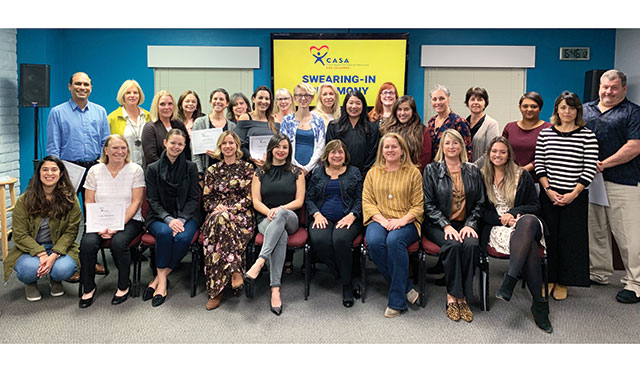When the second of Ellen Hunstein’s two daughters left the nest for college, Ellen wasn’t quite ready to set aside her role as a guide and nurturer to young people. She was looking for a way to give back and also support children.
When children are removed from their home due to a variety of circumstances they are thrown into an unfamiliar adult-oriented social service and legal system that they are dill equipped to understand or navigate. Although they are assigned a social worker, the child may be one of literally dozens of active cases for a single person, meaning the child may only meet with his or her social worker once a month or less. CASA’s become the constant reliable adult in the child’s life who spends the kind of time with them needed to really understand what the child wants and to help advocate for an outcome that is in the child’s best interest.
CASA of Orange County provides training, supervision and guidance to the CASA volunteers. A CASA reports directly to the court on behalf of the child and may also have access to school and medical records to fully understand what the child needs, and to secure medical, educational, therapeutic or other help as needed.
It takes time and requires a commitment to see a child at least twice a month and be with them, ideally, until their cases close in a permanent, supportive home. This is not like volunteering for a day or two and then moving on. The child relies on the CASA and building trust is the foundation of success.
Since Ellen began her CASA service four years ago, her first child’s case only resolved a little over year ago, and she is now working with her second case, a 10-year-old boy.
“I knew I didn’t have it in me to be a foster parent,” said Ellen. “I am a preschool teacher, so I knew I didn’t want to work with very young children, I wanted something a little different. In the same way, being the mother of two girls, I had been through all the girl things so I thought it would be interesting to work with teen boys.”
Teen boys are one of the most challenging age groups but Ellen embraced it. “I never went to superhero movies, played video games or went to soccer tournaments, but with my kiddos, that’s what I did. I found I enjoyed being with the boys – they are much more ‘straight shooters’ than girls.”
Being a CASA is a lot like being an aunt or uncle – most of it is just spending time with the child doing things that they enjoy – going to movies, parks or out for a meal. For many of the kids this is the only time they get away from their group home or foster family for one-on-one time with a caring adult. But in that time, the CASA comes to understand their fears, aspirations and dreams. With this information the CASA can effectively tell the court what the child wants, separate from what sometimes dysfunctional parents assert or overworked social workers believe.
Confidentiality is critical. A CASA cannot take anyone else on an outing with their child – and may not discuss any aspect the case, even the child’s name, with anyone.
Ellen met her first teen boy when he was attending one of Orange County’s Catholic High Schools. Ellen knew that the child was Catholic but was not permitted to discuss religion unless the child specifically brought up the subject.
As the relationship progressed, Ellen attended various school functions that often had religious overtones. Eventually, the child mentioned that he had not been confirmed and that he would like to receive that sacrament.
According to Jenny Leon, chief program officer of CASA Orange County, if a youth requests the CASA’s support in a religious practice, the CASA can be involved, but never can they suggest that the youth be involved in religious practice or that the youth pursue a particular religious endeavor. The policy is that the CASA volunteer does not involve the youth in religious services or events unless initiated by the youth.
After much discussion with her CASA supervisors, Ellen was able to sponsor her youth for his confirmation. “I didn’t want his mother excluded, and made sure she was also involved in the confirmation. But it is very gratifying to be a part of his life’s journey.”
Every CASA’s case is different. Some are resolved fairly quickly but others take years – possibly until the youth turns 18 and is emancipated from the child welfare system. On average the time commitment is 10-15 hours per month, meeting at least two times a month. Training takes about 3 months, and includes a background check and fingerprinting. For more information on what it takes to become a CASA, visit www.casaoc.org.

